Life Cycle Events: Helping Children Deal with Illness and Death of a Loved One |
If you wish to purchase any of these books, click on either the title or the book cover to be directed to Amazon.com. As a warning, I have put up pictures of the book covers to give you somewhat an idea of the style of each book (I know, I know. "Don't judge a book by its cover") so the pages may load slowly, depending on the speed of your internet connection.
If this website came up without frames, Click Here to See the Entire Website
For books (for adults) on Jewish parenting, go to the Jewish Parenting Page
Other Pages of Interest:
Jewish Life Cycle Books for Children:
(Bris & Upsheren)
(Bar Mitzvah, Wedding, & Dealing with Divorce)
(Dealing with Terminal Illness & Death of a Loved One)
Easy Reader and Picture Books:
Jewish Children's Books (General) |
Jewish Board Books |
Biblical Stories for Children |
Jewish Holiday Books |
Jewish Family Cookbooks |
Folktales and Talmudic Stories for Children |
Jewish Life Books (Mitzvot, Keeping Kosher, etc.) |
Jewish Life Cycle Books for Children:
(Bris & Upsheren)
(Bar Mitzvah, Wedding, & Dealing with Divorce)
(Dealing with Terminal Illness & Death of a Loved One) |
Family Haggadahs |
Children's Prayerbooks |
Introductory Hebrew Books |
Jewish History and Historical Fiction Picture Books |
Israel Books
Middle School and YA Books:
Bar Mitzvah Books |
Jewish Fiction |
Historical Fiction |
Torah Study |
Prayer and Jewish Life Books |
Jewish Holidays |
Jewish Biographies |
Jewish History Books |
Holocaust Books for Teens |
Israel Books
Jewish Books for Children |
Bar Mitzvah Books |
Jewish Parenting Books |
Jewish Music for Children |
Jewish Videos |
Jewish Toys and Gifts |
Jewish Gift Baskets and Gourmet Food |
Jewish Jewelry |
Amazon.com Coupons, Promotions, and Sales
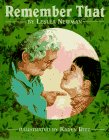
Remember That
By Leslea Newman
Remember That recounts the story of Bubbe as she makes the
progression from living alone to living with her daughter (and
granddaughter) and then finally, to living in a nursing home. Along
the way, she passes on to her grandchild the finer points of Jewish
tradition and a lifetime of valuable lessons, like "always eat when
you're hungry" and "spend a little and save a little and the rest
give away to charity." There is a poignant lesson imbedded in the
story, as the granddaughter learns that while her grandmother may
grow older and change, the love the two share is stronger than age.
Description from Publisher
On Friday nights, Bubbe and her granddaughter celebrate the Jewish
Sabbath. Each time the elderly woman imparts bits of everyday wisdom,
she says "Remember that." As time goes by, she moves from her
apartment to her daughter's home and finally to a nursing home. In
each place the Sabbath ritual continues; Bubbe adapts to her
changing lifestyle in a matter-of-fact way that leaves just as great
an impression on her granddaughter as all her wisdom and her
delicious matzo ball soup. Hebrew words are printed and translated
within the text. The girl's first-person narration is a bit jarring
when, each time her grandmother moves, she states, "Now I am a
little older..." and "Now I'm even older..." Ritz's realistic
watercolors clearly show the bond between the characters, and the
text briefly introduces a few of the rituals associated with Shabbos.
All in all, this glimpse of a loving intergenerational relationship
leaves readers with a warm, happy feeling.
Description from School Library Journal
There are messages aplenty in Leslea Newman's fond Remember That,
engagingly illustrated by Karen Ritz, as Bubbe instructs her grandchild
in Jewish tradition, the fine points of matzoh-ball soup and a host of
valuable life lessons: 'Always eat when you're hungry.' 'Always rest
when you're tired.' 'Always be grateful you have a roof over your head.'
'Spend a little and save a little and the rest give away to
charity. . . . Remember that.' There is another, more poignant, message
as Bubbe moves from living alone to her daughter's house--and then to
a nursing home: 'You have to go wherever life sends you.' But although
some things must change, some never do--like the love between a
granddaughter and her Bubbe.
Description from New York Times Book Review
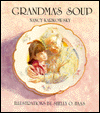
Grandma's Soup
By Nancy Karkowsky
A poignant presentation of mental problems associated with
senility and Alzheimer's disease. Grandma, who has always
made the best chicken soup for Shabbat , suddenly starts to
use inappropriate spices. She forgets her grandchildren's names
and is unable to remember that they have just visited. The
grandchildren are told that she is sick; that this is a problem
sometimes associated with getting old, and that she will
probably not get better. They are also told that they will still visit
and care for her; "that is what families are for--to share the
good times and the bad times.''
Description from School Library Journal
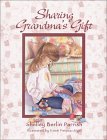
Sharing Grandma's Gift
By Shelley Berlin Parrish
"If my wedding quilt just hangs on the wall, what story will it have to
tell?", Allie wondered. She had learned so much about her own family through
the needlework that was passed down from generation to generation. Would
Allie's quilt ever have a story to share? This compassionate book is the true
story of Allie and her family's journey as they learn to cope with grandma's
terminal illness. It is a heartfelt story of love, hope and family tradition.
It just so happens that Allie's family is Jewish. Grandma's Gift is
intergenerational and a wonderful tool for helping young children cope with
dying and grief. Petosa-Sigel's art is delicately stunning!
Description from Publisher
Charmingly illustrated by Kristi Petosa-Sigel, Sharing Grandma's Gift
is Shelley Parrish's heartfelt and endearing story of love, hope, and family
tradition as young readers follow the efforts of Allie and her family as they
learn to cope with Grandma's terminal illness. Sharing Grandma's Gift is a
unique and welcome introduction for young readers into the issues of family
life that most of us have to cope with sooner or later, both as children, and
as parents, and as grandparents. It should be noted that two-thirds of the
proceeds from the sales of Sharing Grandma's Gift go directly to The Make
A Wish Foundation Of Wisconsin. Still one more reason why every school and
community library, and every caring family with small children facing the
terminal illness of a loved one, should have a copy of Sharing Grandma's Gift.
Description from Children's Book Watch
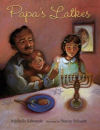
Papa's Latkes
By Michelle Edwards
For Selma and her little sister, Dora, this is their first Chanukah without Mama. When Papa comes home carrying a big bag of potatoes and all the ingredients for latkes, Selma is worried. Mama always made the Chanukah latkes. Could they make them without her? In Michelle Edwards's poignant story, illustrated with Stacey Schuett's warmly glowing artwork, Selma comes to realize that while Chanukah -- and especially latkes -- will never be the same without Mama, Selma can still celebrate, and will always remember.
A family prepares to celebrate Chanukah for the first time since Mama died -- in this heartfelt, bittersweet tale that will resonate with anyone who has ever faced an empty chair at the holiday table.
Description from Publisher

The Ugly Menorah
By Marissa Moss
On the first Hanukkah since Rachel's grandpa died, Rachel is
keeping her grandma company. "Where is your menorah,
Grandma?" Racel asks. When Grandma points to a plain wooden
board with tin cylinders, Rachel can't help crying, "It's so ugly!"
Then Rachel listens as Grandma tells the menorah's history, and
Grandpa seems to fill the house again.
Description from Publisher
Rachel spends the first Hanukkah since her grandfather died at her grandmother's house. She misses her grandfather terribly and the house just doesn't seem the same without him. When it comes time to light the Hanukkah candles, Rachel's grandmother doesn't use a shiny silver menorah like her parents do, but she instead uses a simple wooden board wtih small tin cylinders. When Rachel comments how ugly it looks, her grandmother tells the Depression-era story of how her grandfather made the menorah out of scraps when they couldn't afford a store-bought menorah. She finally comes to realize that the wooden menorah is beautiful and she comes to feel that her grandfather is with her again. Marissa Moss effectively brings together themes of dealing with the loss of a grandparent with the Hanukkah time that children will most often feel their grandparent's absence. Children will be able to relate to Rachel's sense of loss. Parents can use this as a springboard for discussions on ways to remember lost grandparents or how heirlooms represent family history.
Lori's Description

Saying Goodbye to Grandma

Saying Goodbye to Grandpa
These books explain to children the Jewish mourning practices. The
introduction details the steps that parents can take to help their
child through the bereavement process.
In Saying Goodbye to Grandpa, a young boy loses his grandfather
and learns about the Jewish burial and mourning practices in this poignant story.
In Saying Goodbye to Grandpa, a young girl receives the special
Shabbat candelabra that was her grandmother's. A touching story of love and loss.
These are honest books about death,
written especially for Jewish children. They present, through the
eyes of a child, the emotional turmoil and changes in behavior
that occur following the death of a loved one. These books are
recommended for the young child who has already
raised questions about death and dying, as well as for the
child who has experienced the loss of close relatives and
friends. They are also for the child who must, unfortunately, be
prepared for an anticipated death in the family. Traditional
Jewish concepts such as neshamah (soul), Mashiach (Messiah),and
techiat ha-maitim (the awakening from the dead) are dealt with
in these stories. However, these concepts are dealt with at the
level appropriate for a young child. Saying Goodbye to Grandpa/Grandma
is a book that should be read to the child, or with the child,
by an understanding and sensitive adult who is prepared to deal
patiently with the myriad of questions, comments, and fears
children have about death. Used properly, the story will serve
as a catalyst to help the child explore, together with the
parent, his/her new, almost over whelming emotions about
death.
Description from Publisher
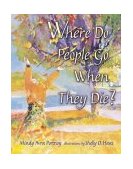
Where Do People Go When They Die?
By Mindy Avra Portnoy
In this touching narrative, young children ask, "Where do people go when they die?" Each child asks an adult that they trust-a father, a mother, a grandfather, an aunt, a teacher-and, although the answers they receive are all different, each reassuring answer leads back to the same simple truth: When people die, "They go to God. Who is everywhere." Includes an afterward and helpful suggestions for parents.
Description from Publisher
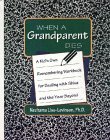
When a Grandparent Dies :
A Kid's Own Remembering Workbook for Dealing With Shiva
and the Year Beyond
The death of a grandparent is often a child's first encounter with grief.
Why did this happen? What should I do? How do I feel? This
workbook helps children to participate in the process of mourning,
and overcome the awkwardness that often accompanies their
participation in grieving rituals.Drawing insights from both psychology
and Jewish tradition, When a Grandparent Dies offers
children guided exercises, rituals, and places to write, draw, list,
create, and express their feelings. Appropriate for children aged 7-11,
the workbook moves from the immediacy of shiva through the entire
year of mourning.Children and parents who use this book together
will have a unique opportunity for sharing as they come to know
more about themselves, their family, and the complexities of life and death.
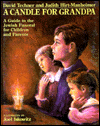
A Candle for Grandpa: A Guide to the Jewish Funeral for Children and Parents
Jewish funeral practices are explained carefully and gently from
the perspective of an 11-year-old boy on the first anniversary of
his grandfather's death. No special knowledge is needed to
understand this book-each step is thoroughly detailed. A glossary
and notes to parents about handling death with children are
included. Although Techner represents Orthodox Jewish practice,
the book was published by the Reform movement and thus has a more
universal appeal.

For Heaven's Sake
By Sandy Eisenberg Sasso
Isaiah hears the expression,"for heaven's sake" often, and decides he wants to
find out what and where heaven is, particularly since he has been told that his
grandfather is there. After unsatisfactory answers from his father, uncle,
sister, and the mail carrier, he asks his grandmother. Isaiah and his
grandmother then spend the day looking for heaven in all the places that his
grandfather frequented: the soup kitchen where he volunteered, the library, and
choir practice. When the child does not see the intended connections, Grandma
answers, "I think, Isaiah, we can get close to heaven and to God in a place in
our hearts. I feel there is a part of Grandpa in all the places and people we
visited today, and a little bit of heaven, too." Sasso's comforting words and
Finney's large, vibrant paintings will draw in young listeners. An excellent,
nonsectarian choice for exploring a difficult concept.
Description from School Library Journal
Isaiah keeps hearing people say, "For heaven's sake," but no one seems able to
tell him where or what heaven is. For his dad, heaven is eating fudge brownies,
for his uncle, heaven is some place up in the sky. Isaiah's sister isn't sure
there's a heaven at all. Finally, Isaiah goes to his recently widowed
grandmother, who says she will show him heaven. At first, Isaiah is confused.
How can heaven be at the soup kitchen, the library, and in a choir concert. But
as his grandmother explains, heaven is found in unlikely places, and in one's
heart. Finally, Isaiah understands: "Grandpa is in heaven, and heaven is also
in you." ... Children will intuitively understand the message that there can be
many representations of heaven and many places where it could be found. The
acrylic paintings, if not conventionally attractive, are eye-catching and
strong. A thoughtful rendering.
Description from Booklist
This thoughtful, honest picture book offers answers to the question "What is
heaven?" Sasso--a rabbi and the author of such picture books as
In
G-d's Name--works in concert with a young reader's imagination: her approach
is firmly grounded yet sensitive, responding to a child's concerns while leaving
room for personal interpretation. Her protagonist, Isaiah, hearing phrases like
"for heaven's sake," asks about heaven, but none of the answers he receives
satisfies him. Finally, remembering that his grandfather was said to have gone
to heaven after his death a few months earlier, Isaiah turns to his grandmother.
She agrees to help him look for heaven, and takes him first to the soup kitchen
where his grandfather had volunteered, then to story hour at the library and
finally to a choir rehearsal. Isaiah has a good time, but doesn't understand,
until Grandma explains: "I think we can get close to heaven and to G-d in a
place in our hearts. I feel there is a part of Grandpa in all the places and
people we visited today, and a little bit of heaven, too."
Description from Publishers Weekly
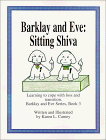
Barklay and Eve: Sitting Shiva
By Karen L. Carney
This selection describes the Jewish tradition of burial and
mourning. It includes an explanation of the term "Sitting Shiva"
and of the rich symbolism of mourning ribbons, covering mirrors,
memorial candles, the meal of consolation, unveiling and other
practices of the Jewish Heritage.
Description from Publisher

The Remembering Box
By Eth Clifford
Nine-year-old Joshua has visited his Grandma Goldina on the Sabbath since he was
five. Joshua loves Roy Rogers and other heroes of his day (1942), but he especially
loves these times with Grandma. Every week he picks something out of a big trunk
this is Grandma's ``remembering box''and each object reminds her of a story of her
childhood. Joshua listens in rapt attention to her humorous tales of adventure that
evoke ``the old country.'' Then one night Grandma gives Joshua his own box, and in
it are some of his favorites from her box. When Grandma does not open her eyes after
her reverie, Joshua carries on the tradition of lighting the Sabbath candles before calling
his father. Grandma has passed on more than her own memories; she has given him a
sense of heritage of his people as well. This warm and loving relationship between a
boy and his grandmother is beautifully depicted and reminiscent of Mathis' The Hundred
Penny Box (Viking, 1975). Diamond's silhouettes, used for the stories that Grandma tells
Joshua, are dramatic, and her meticulously detailed black-and-white illustrations of Joshua
and his grandmother are both expressive and moving.
From School Library Journal
Ages 9-12

Lost and Found :
A Kid's Book for Living Through Loss
By Rabbi Marc Gellman and Monsignor Thomas Hartman
Familiar television faces and the authors of How Do You Spell God?
(1995), Gellman, a rabbi, and Hartman, a Roman Catholic priest, explore
issues of loss for elementary-and middle-school students, and for parents
who want to discuss such concerns with their children. Using words like
"stuffy" and "busting up," their informal text is aimed straight at kids and
incorporates lots of examples children can relate to as well as relevant
excerpts from such wide-ranging sources as A. A. Milne's Winnie the
Pooh and Sarah Dessen's 1996 teen novel, That Summer.
Careful not to patronize or denigrate, they begin with discussion of "small"
losses--a missing toy, a friend's moving away--and proceed to losses of
greater magnitude, such as divorce or the death of a loved one. With a
few exceptions, such as a discussion of the soul, this is not a strictly
religious book. Rather it is a practical, heartfelt exploration that emphasizes
the idea of picking up after a loss and learning to look back with fondness
and understanding. A list of further readings is appended.
Description from Booklist
A useful self-help book is a real find, and one just for kids-what a concept!
And good from both Christian and Jewish points of view. Neither Christianity
nor Judaism is vital to using the concepts found here; Gellman and Hartman
bring wisdom and insight to the very real problems that children of any age
face. For any child to admit that he/she feels lost and needs help is a major
step towards maturity. And this book, that tells you how to help yourself, is
terrific. No matter what's been lost-friend, health, parent, temper-all are
covered here. Written in a plain, straightforward style that neither talks down
to kids or expects too much knowledge from them, it's totally enjoyable.
Description from Children's Literature

Daddy's Chair
By Sandy Lanton
Lanton succeeds in presenting the concept of a parent's death in a manner
that is sensitive, realistic, and appropriate for young children. Although
he knows that his father has died of cancer, Michael, the younger of two
boys, can't believe that his father won't sit in his special chair again
to read stories and play checkers. General concepts necessary to the process
of accepting death are explained such as the fact that "good guys die" and
that dead means the person won't ever come back. In addition, more specific
Jewish customs and traditions observed during the seven days of shiva are
discussed. Realistic sepia-toned illustrations convey emotions appropriate
to the text, capturing both the family unity and love, as well as the
pervasive sense of sadness. A well-done book on a difficult subject.
Description from School Library Journal
Grieving for his father, who has just died of cancer, Michael defends
Daddy's chair from all comers. Understanding relatives gradually get him
to allow temporary occupancy: his big brother may sit there while he plays
chess with Michael, as Daddy did; an aunt is willing to share some of the
stories Daddy told; Mommy promises to hug Michael, like Daddy did, when
they watch TV together in the chair. Meanwhile, Mommy has also explained
sitting shiva. With dignified simplicity--nicely reflected in Haas's
eloquent monochromatic watercolors--the story conveys the family's
traditions and their loving support of one another. A good addition to
the literature about grief.
Description from Kirkus Reviews
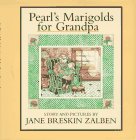
Pearl's Marigolds for Grandpa
That irrepressible lamb Pearl is back, though her spirit is
understandably dampened, in Zalben's thoughtful exploration of
death and the grieving process. After her grandfather's passing,
Pearl is downcast ("Who will read me stories for as long as I want?
Who will send me marigold seeds this spring?"), but the tenderness
of family and friends carries her through her sadness. And, in an
uplifting ending that reinforces the continuity of life, Pearl
plants marigolds just as she did with her grandfather and
resolves to carry on his traditions with her own grandchildren
("I'll let them pick the red checkers, and win, and read stories
way past their bedtimes. Just like Grandpa"). Zalben's
compassionate tale never becomes saccharine, and her delicate,
detailed watercolors (e.g., Pearl being comforted on her mother's
lap, Pearl sitting wistfully in her Grandpa's favorite chair)
unfold like a series of snapshots, creating a cozy counterpoint
to the somber theme. Concluding with a brief explanation of
burial and mourning customs of different faiths, the broader
context makes this book a particularly welcome addition on the
subject.
Description by Publisher's Weekly
Bris & Upsheren |
Bar Mitzvah, Wedding, & Dealing with Divorce |
Dealing with Terminal Illness & Death of a Loved One
Still can't find what you're looking for? Search Amazon.com's database directly.
©1999-2009
(NOTE: The following links have NOT been placed on the site by the website owners. We have no control over which ads are selected and are not responsible for their religious content.)
If this website came up without frames, Click Here to See the Entire Website
For books (for adults) on Jewish parenting, go to the Jewish Parenting Page
Other Pages of Interest:
Jewish Life Cycle Books for Children:
(Bris & Upsheren)
(Bar Mitzvah, Wedding, & Dealing with Divorce)
(Dealing with Terminal Illness & Death of a Loved One)
Easy Reader and Picture Books:
Jewish Children's Books (General) |
Jewish Board Books |
Biblical Stories for Children |
Jewish Holiday Books |
Jewish Family Cookbooks |
Folktales and Talmudic Stories for Children |
Jewish Life Books (Mitzvot, Keeping Kosher, etc.) |
Jewish Life Cycle Books for Children:
(Bris & Upsheren)
(Bar Mitzvah, Wedding, & Dealing with Divorce)
(Dealing with Terminal Illness & Death of a Loved One) |
Family Haggadahs |
Children's Prayerbooks |
Introductory Hebrew Books |
Jewish History and Historical Fiction Picture Books |
Israel Books
Middle School and YA Books:
Bar Mitzvah Books |
Jewish Fiction |
Historical Fiction |
Torah Study |
Prayer and Jewish Life Books |
Jewish Holidays |
Jewish Biographies |
Jewish History Books |
Holocaust Books for Teens |
Israel Books
Jewish Books for Children |
Bar Mitzvah Books |
Jewish Parenting Books |
Jewish Music for Children |
Jewish Videos |
Jewish Toys and Gifts |
Jewish Gift Baskets and Gourmet Food |
Jewish Jewelry |
Amazon.com Coupons, Promotions, and Sales
Easy Reader and Picture Books:
Jewish Children's Books (General) | Jewish Board Books | Biblical Stories for Children | Jewish Holiday Books | Jewish Family Cookbooks | Folktales and Talmudic Stories for Children | Jewish Life Books (Mitzvot, Keeping Kosher, etc.) | Jewish Life Cycle Books for Children: (Bris & Upsheren) (Bar Mitzvah, Wedding, & Dealing with Divorce) (Dealing with Terminal Illness & Death of a Loved One) | Family Haggadahs | Children's Prayerbooks | Introductory Hebrew Books | Jewish History and Historical Fiction Picture Books | Israel Books
Middle School and YA Books:
Bar Mitzvah Books | Jewish Fiction | Historical Fiction | Torah Study | Prayer and Jewish Life Books | Jewish Holidays | Jewish Biographies | Jewish History Books | Holocaust Books for Teens | Israel Books
Jewish Books for Children | Bar Mitzvah Books | Jewish Parenting Books | Jewish Music for Children | Jewish Videos | Jewish Toys and Gifts | Jewish Gift Baskets and Gourmet Food | Jewish Jewelry | Amazon.com Coupons, Promotions, and Sales

Remember That By Leslea Newman |
Remember That recounts the story of Bubbe as she makes the
progression from living alone to living with her daughter (and
granddaughter) and then finally, to living in a nursing home. Along
the way, she passes on to her grandchild the finer points of Jewish
tradition and a lifetime of valuable lessons, like "always eat when
you're hungry" and "spend a little and save a little and the rest
give away to charity." There is a poignant lesson imbedded in the
story, as the granddaughter learns that while her grandmother may
grow older and change, the love the two share is stronger than age.
On Friday nights, Bubbe and her granddaughter celebrate the Jewish Sabbath. Each time the elderly woman imparts bits of everyday wisdom, she says "Remember that." As time goes by, she moves from her apartment to her daughter's home and finally to a nursing home. In each place the Sabbath ritual continues; Bubbe adapts to her changing lifestyle in a matter-of-fact way that leaves just as great an impression on her granddaughter as all her wisdom and her delicious matzo ball soup. Hebrew words are printed and translated within the text. The girl's first-person narration is a bit jarring when, each time her grandmother moves, she states, "Now I am a little older..." and "Now I'm even older..." Ritz's realistic watercolors clearly show the bond between the characters, and the text briefly introduces a few of the rituals associated with Shabbos. All in all, this glimpse of a loving intergenerational relationship leaves readers with a warm, happy feeling. There are messages aplenty in Leslea Newman's fond Remember That, engagingly illustrated by Karen Ritz, as Bubbe instructs her grandchild in Jewish tradition, the fine points of matzoh-ball soup and a host of valuable life lessons: 'Always eat when you're hungry.' 'Always rest when you're tired.' 'Always be grateful you have a roof over your head.' 'Spend a little and save a little and the rest give away to charity. . . . Remember that.' There is another, more poignant, message as Bubbe moves from living alone to her daughter's house--and then to a nursing home: 'You have to go wherever life sends you.' But although some things must change, some never do--like the love between a granddaughter and her Bubbe. |

Grandma's Soup By Nancy Karkowsky |
A poignant presentation of mental problems associated with
senility and Alzheimer's disease. Grandma, who has always
made the best chicken soup for Shabbat , suddenly starts to
use inappropriate spices. She forgets her grandchildren's names
and is unable to remember that they have just visited. The
grandchildren are told that she is sick; that this is a problem
sometimes associated with getting old, and that she will
probably not get better. They are also told that they will still visit
and care for her; "that is what families are for--to share the
good times and the bad times.''
|

Sharing Grandma's Gift By Shelley Berlin Parrish |
"If my wedding quilt just hangs on the wall, what story will it have to
tell?", Allie wondered. She had learned so much about her own family through
the needlework that was passed down from generation to generation. Would
Allie's quilt ever have a story to share? This compassionate book is the true
story of Allie and her family's journey as they learn to cope with grandma's
terminal illness. It is a heartfelt story of love, hope and family tradition.
It just so happens that Allie's family is Jewish. Grandma's Gift is
intergenerational and a wonderful tool for helping young children cope with
dying and grief. Petosa-Sigel's art is delicately stunning!
Charmingly illustrated by Kristi Petosa-Sigel, Sharing Grandma's Gift is Shelley Parrish's heartfelt and endearing story of love, hope, and family tradition as young readers follow the efforts of Allie and her family as they learn to cope with Grandma's terminal illness. Sharing Grandma's Gift is a unique and welcome introduction for young readers into the issues of family life that most of us have to cope with sooner or later, both as children, and as parents, and as grandparents. It should be noted that two-thirds of the proceeds from the sales of Sharing Grandma's Gift go directly to The Make A Wish Foundation Of Wisconsin. Still one more reason why every school and community library, and every caring family with small children facing the terminal illness of a loved one, should have a copy of Sharing Grandma's Gift. |
 Papa's Latkes By Michelle Edwards |
For Selma and her little sister, Dora, this is their first Chanukah without Mama. When Papa comes home carrying a big bag of potatoes and all the ingredients for latkes, Selma is worried. Mama always made the Chanukah latkes. Could they make them without her? In Michelle Edwards's poignant story, illustrated with Stacey Schuett's warmly glowing artwork, Selma comes to realize that while Chanukah -- and especially latkes -- will never be the same without Mama, Selma can still celebrate, and will always remember.
A family prepares to celebrate Chanukah for the first time since Mama died -- in this heartfelt, bittersweet tale that will resonate with anyone who has ever faced an empty chair at the holiday table. |
 The Ugly Menorah By Marissa Moss |
On the first Hanukkah since Rachel's grandpa died, Rachel is
keeping her grandma company. "Where is your menorah,
Grandma?" Racel asks. When Grandma points to a plain wooden
board with tin cylinders, Rachel can't help crying, "It's so ugly!"
Then Rachel listens as Grandma tells the menorah's history, and
Grandpa seems to fill the house again.
Rachel spends the first Hanukkah since her grandfather died at her grandmother's house. She misses her grandfather terribly and the house just doesn't seem the same without him. When it comes time to light the Hanukkah candles, Rachel's grandmother doesn't use a shiny silver menorah like her parents do, but she instead uses a simple wooden board wtih small tin cylinders. When Rachel comments how ugly it looks, her grandmother tells the Depression-era story of how her grandfather made the menorah out of scraps when they couldn't afford a store-bought menorah. She finally comes to realize that the wooden menorah is beautiful and she comes to feel that her grandfather is with her again. Marissa Moss effectively brings together themes of dealing with the loss of a grandparent with the Hanukkah time that children will most often feel their grandparent's absence. Children will be able to relate to Rachel's sense of loss. Parents can use this as a springboard for discussions on ways to remember lost grandparents or how heirlooms represent family history. |

Saying Goodbye to Grandma 
Saying Goodbye to Grandpa |
These books explain to children the Jewish mourning practices. The
introduction details the steps that parents can take to help their
child through the bereavement process.
In Saying Goodbye to Grandpa, a young boy loses his grandfather and learns about the Jewish burial and mourning practices in this poignant story. In Saying Goodbye to Grandpa, a young girl receives the special Shabbat candelabra that was her grandmother's. A touching story of love and loss. These are honest books about death, written especially for Jewish children. They present, through the eyes of a child, the emotional turmoil and changes in behavior that occur following the death of a loved one. These books are recommended for the young child who has already raised questions about death and dying, as well as for the child who has experienced the loss of close relatives and friends. They are also for the child who must, unfortunately, be prepared for an anticipated death in the family. Traditional Jewish concepts such as neshamah (soul), Mashiach (Messiah),and techiat ha-maitim (the awakening from the dead) are dealt with in these stories. However, these concepts are dealt with at the level appropriate for a young child. Saying Goodbye to Grandpa/Grandma is a book that should be read to the child, or with the child, by an understanding and sensitive adult who is prepared to deal patiently with the myriad of questions, comments, and fears children have about death. Used properly, the story will serve as a catalyst to help the child explore, together with the parent, his/her new, almost over whelming emotions about death. |

Where Do People Go When They Die? By Mindy Avra Portnoy |
In this touching narrative, young children ask, "Where do people go when they die?" Each child asks an adult that they trust-a father, a mother, a grandfather, an aunt, a teacher-and, although the answers they receive are all different, each reassuring answer leads back to the same simple truth: When people die, "They go to God. Who is everywhere." Includes an afterward and helpful suggestions for parents.
|

When a Grandparent Dies : A Kid's Own Remembering Workbook for Dealing With Shiva and the Year Beyond |
The death of a grandparent is often a child's first encounter with grief. Why did this happen? What should I do? How do I feel? This workbook helps children to participate in the process of mourning, and overcome the awkwardness that often accompanies their participation in grieving rituals.Drawing insights from both psychology and Jewish tradition, When a Grandparent Dies offers children guided exercises, rituals, and places to write, draw, list, create, and express their feelings. Appropriate for children aged 7-11, the workbook moves from the immediacy of shiva through the entire year of mourning.Children and parents who use this book together will have a unique opportunity for sharing as they come to know more about themselves, their family, and the complexities of life and death. |

A Candle for Grandpa: A Guide to the Jewish Funeral for Children and Parents |
Jewish funeral practices are explained carefully and gently from the perspective of an 11-year-old boy on the first anniversary of his grandfather's death. No special knowledge is needed to understand this book-each step is thoroughly detailed. A glossary and notes to parents about handling death with children are included. Although Techner represents Orthodox Jewish practice, the book was published by the Reform movement and thus has a more universal appeal. |
 For Heaven's Sake By Sandy Eisenberg Sasso |
Isaiah hears the expression,"for heaven's sake" often, and decides he wants to
find out what and where heaven is, particularly since he has been told that his
grandfather is there. After unsatisfactory answers from his father, uncle,
sister, and the mail carrier, he asks his grandmother. Isaiah and his
grandmother then spend the day looking for heaven in all the places that his
grandfather frequented: the soup kitchen where he volunteered, the library, and
choir practice. When the child does not see the intended connections, Grandma
answers, "I think, Isaiah, we can get close to heaven and to God in a place in
our hearts. I feel there is a part of Grandpa in all the places and people we
visited today, and a little bit of heaven, too." Sasso's comforting words and
Finney's large, vibrant paintings will draw in young listeners. An excellent,
nonsectarian choice for exploring a difficult concept.
Isaiah keeps hearing people say, "For heaven's sake," but no one seems able to tell him where or what heaven is. For his dad, heaven is eating fudge brownies, for his uncle, heaven is some place up in the sky. Isaiah's sister isn't sure there's a heaven at all. Finally, Isaiah goes to his recently widowed grandmother, who says she will show him heaven. At first, Isaiah is confused. How can heaven be at the soup kitchen, the library, and in a choir concert. But as his grandmother explains, heaven is found in unlikely places, and in one's heart. Finally, Isaiah understands: "Grandpa is in heaven, and heaven is also in you." ... Children will intuitively understand the message that there can be many representations of heaven and many places where it could be found. The acrylic paintings, if not conventionally attractive, are eye-catching and strong. A thoughtful rendering. This thoughtful, honest picture book offers answers to the question "What is heaven?" Sasso--a rabbi and the author of such picture books as In G-d's Name--works in concert with a young reader's imagination: her approach is firmly grounded yet sensitive, responding to a child's concerns while leaving room for personal interpretation. Her protagonist, Isaiah, hearing phrases like "for heaven's sake," asks about heaven, but none of the answers he receives satisfies him. Finally, remembering that his grandfather was said to have gone to heaven after his death a few months earlier, Isaiah turns to his grandmother. She agrees to help him look for heaven, and takes him first to the soup kitchen where his grandfather had volunteered, then to story hour at the library and finally to a choir rehearsal. Isaiah has a good time, but doesn't understand, until Grandma explains: "I think we can get close to heaven and to G-d in a place in our hearts. I feel there is a part of Grandpa in all the places and people we visited today, and a little bit of heaven, too." |

Barklay and Eve: Sitting Shiva By Karen L. Carney |
This selection describes the Jewish tradition of burial and
mourning. It includes an explanation of the term "Sitting Shiva"
and of the rich symbolism of mourning ribbons, covering mirrors,
memorial candles, the meal of consolation, unveiling and other
practices of the Jewish Heritage.
|

The Remembering Box By Eth Clifford |
Nine-year-old Joshua has visited his Grandma Goldina on the Sabbath since he was
five. Joshua loves Roy Rogers and other heroes of his day (1942), but he especially
loves these times with Grandma. Every week he picks something out of a big trunk
this is Grandma's ``remembering box''and each object reminds her of a story of her
childhood. Joshua listens in rapt attention to her humorous tales of adventure that
evoke ``the old country.'' Then one night Grandma gives Joshua his own box, and in
it are some of his favorites from her box. When Grandma does not open her eyes after
her reverie, Joshua carries on the tradition of lighting the Sabbath candles before calling
his father. Grandma has passed on more than her own memories; she has given him a
sense of heritage of his people as well. This warm and loving relationship between a
boy and his grandmother is beautifully depicted and reminiscent of Mathis' The Hundred
Penny Box (Viking, 1975). Diamond's silhouettes, used for the stories that Grandma tells
Joshua, are dramatic, and her meticulously detailed black-and-white illustrations of Joshua
and his grandmother are both expressive and moving.
Ages 9-12 |
 Lost and Found : A Kid's Book for Living Through Loss By Rabbi Marc Gellman and Monsignor Thomas Hartman |
Familiar television faces and the authors of How Do You Spell God?
(1995), Gellman, a rabbi, and Hartman, a Roman Catholic priest, explore
issues of loss for elementary-and middle-school students, and for parents
who want to discuss such concerns with their children. Using words like
"stuffy" and "busting up," their informal text is aimed straight at kids and
incorporates lots of examples children can relate to as well as relevant
excerpts from such wide-ranging sources as A. A. Milne's Winnie the
Pooh and Sarah Dessen's 1996 teen novel, That Summer.
Careful not to patronize or denigrate, they begin with discussion of "small"
losses--a missing toy, a friend's moving away--and proceed to losses of
greater magnitude, such as divorce or the death of a loved one. With a
few exceptions, such as a discussion of the soul, this is not a strictly
religious book. Rather it is a practical, heartfelt exploration that emphasizes
the idea of picking up after a loss and learning to look back with fondness
and understanding. A list of further readings is appended.
A useful self-help book is a real find, and one just for kids-what a concept! And good from both Christian and Jewish points of view. Neither Christianity nor Judaism is vital to using the concepts found here; Gellman and Hartman bring wisdom and insight to the very real problems that children of any age face. For any child to admit that he/she feels lost and needs help is a major step towards maturity. And this book, that tells you how to help yourself, is terrific. No matter what's been lost-friend, health, parent, temper-all are covered here. Written in a plain, straightforward style that neither talks down to kids or expects too much knowledge from them, it's totally enjoyable. |

Daddy's Chair By Sandy Lanton |
Lanton succeeds in presenting the concept of a parent's death in a manner
that is sensitive, realistic, and appropriate for young children. Although
he knows that his father has died of cancer, Michael, the younger of two
boys, can't believe that his father won't sit in his special chair again
to read stories and play checkers. General concepts necessary to the process
of accepting death are explained such as the fact that "good guys die" and
that dead means the person won't ever come back. In addition, more specific
Jewish customs and traditions observed during the seven days of shiva are
discussed. Realistic sepia-toned illustrations convey emotions appropriate
to the text, capturing both the family unity and love, as well as the
pervasive sense of sadness. A well-done book on a difficult subject.
Grieving for his father, who has just died of cancer, Michael defends Daddy's chair from all comers. Understanding relatives gradually get him to allow temporary occupancy: his big brother may sit there while he plays chess with Michael, as Daddy did; an aunt is willing to share some of the stories Daddy told; Mommy promises to hug Michael, like Daddy did, when they watch TV together in the chair. Meanwhile, Mommy has also explained sitting shiva. With dignified simplicity--nicely reflected in Haas's eloquent monochromatic watercolors--the story conveys the family's traditions and their loving support of one another. A good addition to the literature about grief. |

Pearl's Marigolds for Grandpa |
That irrepressible lamb Pearl is back, though her spirit is
understandably dampened, in Zalben's thoughtful exploration of
death and the grieving process. After her grandfather's passing,
Pearl is downcast ("Who will read me stories for as long as I want?
Who will send me marigold seeds this spring?"), but the tenderness
of family and friends carries her through her sadness. And, in an
uplifting ending that reinforces the continuity of life, Pearl
plants marigolds just as she did with her grandfather and
resolves to carry on his traditions with her own grandchildren
("I'll let them pick the red checkers, and win, and read stories
way past their bedtimes. Just like Grandpa"). Zalben's
compassionate tale never becomes saccharine, and her delicate,
detailed watercolors (e.g., Pearl being comforted on her mother's
lap, Pearl sitting wistfully in her Grandpa's favorite chair)
unfold like a series of snapshots, creating a cozy counterpoint
to the somber theme. Concluding with a brief explanation of
burial and mourning customs of different faiths, the broader
context makes this book a particularly welcome addition on the
subject.
|